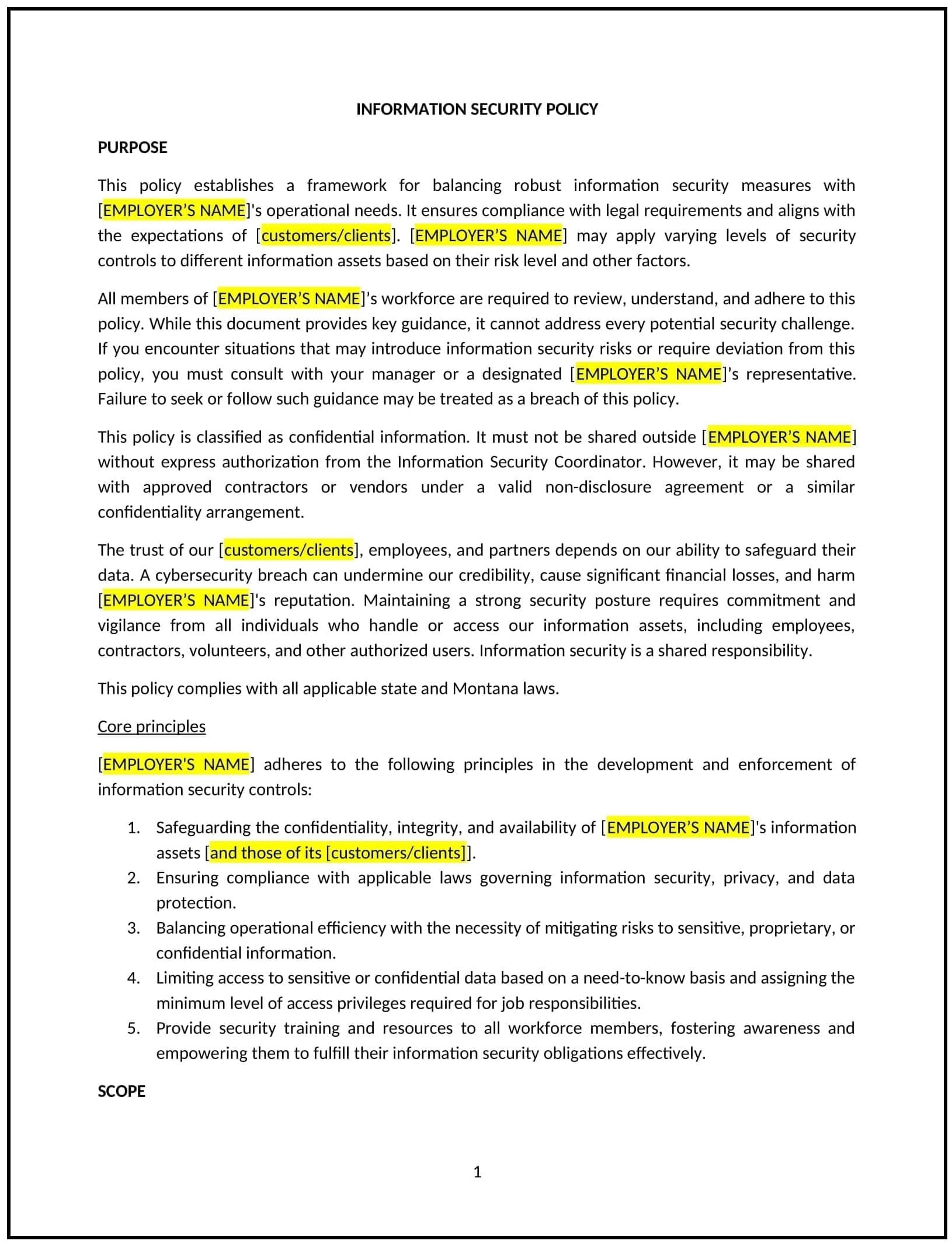Information security policy (Montana): Free template
Got contracts to review? While you're here for policies, let Cobrief make contract review effortless—start your free review now.

Customize this template for free
Information security policy (Montana)
An information security policy helps Montana businesses safeguard their sensitive data, prevent unauthorized access, and protect against cyber threats. This policy outlines the measures businesses should take to secure their information systems, ensure data privacy, and maintain the integrity of the organization’s digital assets.
By implementing this policy, businesses can reduce the risk of data breaches, comply with legal requirements, and protect both internal and customer data from cyber threats and unauthorized access.
How to use this information security policy (Montana)
- Define data security objectives: The policy should clearly outline the goals of the information security program, including protecting confidentiality, integrity, and availability of company data and systems.
- Identify roles and responsibilities: The policy should specify the roles and responsibilities of employees, IT personnel, and management in maintaining information security, including user access controls, data handling practices, and reporting incidents.
- Establish security measures and controls: Businesses should outline the technical measures and security protocols used to protect data, including encryption, firewalls, intrusion detection systems, and regular software updates.
- Set access control guidelines: The policy should specify how access to sensitive data and systems is managed, including the use of strong passwords, multi-factor authentication, and least-privilege access principles.
- Define incident response procedures: The policy should establish clear protocols for responding to data breaches, cyber-attacks, or other security incidents, including reporting, containment, and recovery processes.
- Promote employee awareness and training: The policy should include provisions for ongoing employee training on data security best practices, phishing prevention, and how to recognize and respond to security threats.
- Review and update regularly: The policy should be reviewed periodically to ensure it stays up-to-date with new security threats, regulatory requirements, and technological advancements.
Benefits of using this information security policy (Montana)
This policy provides several key benefits for Montana businesses:
- Protects sensitive data: A strong information security policy helps businesses prevent unauthorized access to critical data, reducing the risk of breaches or leaks that could damage the company’s reputation.
- Enhances customer trust: Customers are more likely to trust businesses that have robust information security policies in place, knowing their data is being protected from cyber threats.
- Reduces the risk of cyberattacks: The policy helps businesses identify potential vulnerabilities, implement preventive measures, and respond quickly to incidents, minimizing the risk of cyberattacks.
- Supports regulatory compliance: A well-implemented information security policy ensures that businesses comply with data protection regulations, such as GDPR or CCPA, avoiding potential fines and penalties.
- Improves business continuity: By securing data and systems, businesses are better equipped to respond to security incidents and recover from disruptions quickly, maintaining operations even in the face of cyber threats.
- Reduces financial loss: Preventing data breaches and cyberattacks reduces the financial impact that these incidents can have on the business, including the costs of recovery, fines, and potential lawsuits.
Tips for using this information security policy (Montana)
- Communicate the policy clearly: Ensure that all employees are aware of the information security policy and understand their role in maintaining data security, including handling sensitive data and reporting security incidents.
- Conduct regular risk assessments: Regularly assess the business’s information systems for potential vulnerabilities and threats. Address any identified risks through appropriate security measures and controls.
- Implement strong access controls: Ensure that access to sensitive data and systems is tightly controlled, using methods such as role-based access controls, multi-factor authentication, and encryption.
- Provide ongoing training: Offer regular training to employees on information security best practices, how to spot phishing attempts, and the proper way to handle and store sensitive data.
- Regularly update systems and software: Ensure that all software, including operating systems and security tools, is up-to-date and patched regularly to protect against known vulnerabilities.
- Establish a security incident response plan: Prepare an incident response plan that includes clear steps for identifying, containing, and mitigating security incidents. Regularly test and update the plan.
- Review the policy regularly: The policy should be reviewed annually or after any major security incidents to ensure that it remains relevant and effective in addressing new threats and regulatory requirements.